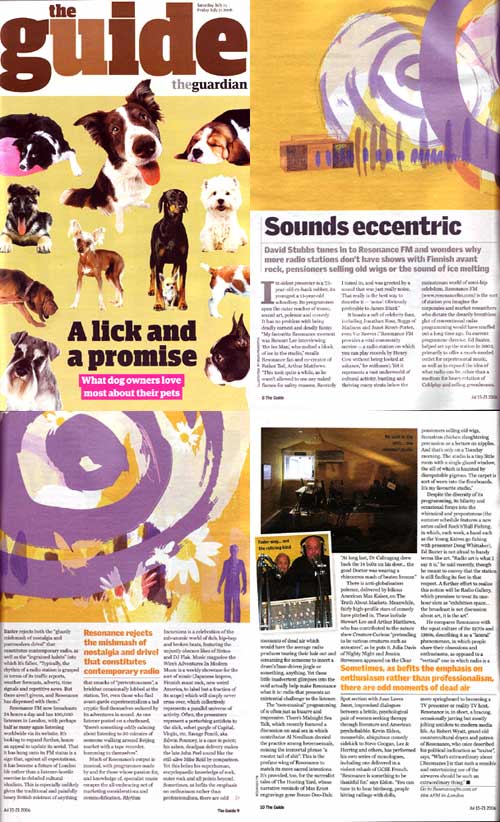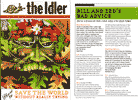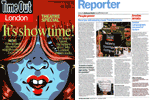press - related
[<<<] [>>>] click on image to enlarge

© tracey moberly 060714.Res.jpg
The Guardian
Tracey Moberly Resonance FM ResonanceFM Resonance104.4FM
Sounds eccentric
David Stubbs tunes in to Resonance FM and wonders why more radio stations don't have shows with Finnish avant rock, pensioners selling old wigs or the sound of ice melting
Saturday July 15, 2006
Its oldest presenter is a 73-year-old ex-bank robber, its youngest a 15-year-old schoolboy. Its programmes span the outer reaches of music, sound art, polemic and comedy. It has no problem with being deadly earnest and deadly funny. "My favourite Resonance moment was Stewart Lee interviewing 'the Ice Man', who melted a block of ice in the studio," recalls Resonance fan and co-creator of Father Ted, Arthur Matthews. "This took quite a while, as he wasn't allowed to use any naked flames for safety reasons. Recently I tuned in, and was greeted by a sound that was just really noise. That really is the best way to describe it - 'noise'. Obviously preferable to James Blunt."
It boasts a raft of celebrity fans, including Jonathan Ross, Suggs of Madness and Janet Street-Porter, even Vic Reeves ("Resonance FM provides a vital community service - a radio station on which you can play records by Henry Cow without being looked at askance," he enthuses). Yet it represents a vast underworld of cultural activity, bustling and thriving many strata below the mainstream world of semi-hip celebdom.
Resonance FM (http://www.resonancefm.com) is the sort of station you imagine the corporates and market researchers who dictate the drearily breathless glut of conventional radio programming would have snuffed out a long time ago. Its current programme director, Ed Baxter, helped set up the station in 2002, primarily to offer a much-needed outlet for experimental music, as well as to expand the idea of what radio can be, other than a medium for heavy rotation of Coldplay and selling greenhouses. Baxter rejects both the "ghastly mishmash of nostalgia and postmodern drivel" that constitutes contemporary radio, as well as the "ingrained habits" into which it's fallen. "Typically, the rhythm of a radio station is grasped in terms of its traffic reports, weather forecasts, adverts, time signals and repetitive news. But these aren't givens, and Resonance has dispensed with them."
Resonance FM now broadcasts 24 hours a day and has 100,000 listeners in London, with perhaps half as many again listening worldwide via its website. It's looking to expand further, hence an appeal to update its aerial. That it has hung onto its FM status is a sign that, against all expectations, it has become a fixture of London life rather than a listener-hostile exercise in deluded cultural idealism. This is especially unlikely given the traditional and painfully hoary British mistrust of anything that smacks of "pretentiousness", a brickbat occasionally lobbed at the station. Yet, even those who find avant-garde experimentalism a tad cryptic find themselves seduced by its adventures in sound. As one listener posted on a chatboard, "there's something oddly calming about listening to 30 minutes of someone walking around Beijing market with a tape recorder, humming to themselves".
Much of Resonance's output is musical, with programmes made by and for those whose passion for, and knowledge of, specialist music escapes the all-embracing net of marketing considerations and commodification. Rhythm Incursions is a celebration of the sub-atomic world of dub, hip-hop and broken beats, featuring the unjustly obscure likes of Sixtoo and DJ Flak. Music magazine the Wire's Adventures In Modern Music is a weekly showcase for the sort of music (Japanese improv, Finnish avant rock, new weird America, to label but a fraction of its scope) which will simply never cross over, which collectively represents a parallel universe of activity.
Often, the presenters represent a perturbing antidote to the slick, velvet gurgle of Capital, Virgin, etc. Savage Pencil, aka Edwin Pouncey, is a case in point; his ashen, deadpan delivery makes the late John Peel sound like the still-alive Mike Reid by comparison. Yet this belies his superhuman, encyclopaedic knowledge of rock, outer rock and all points beyond. Sometimes, as befits the emphasis on enthusiasm rather than professionalism, there are odd moments of dead air which would have the average radio producer tearing their hair out and screaming for someone to insert a drum'n'bass-driven jingle or something, anything. Yet these little inadvertent glimpses into the void actually help make Resonance what it is: radio that presents an existential challenge to the listener.
The "non-musical" programming of is often just as bizarre and impressive. There's Midnight Sex Talk, which recently featured a discussion on anal sex in which contributor Al Needham decried the practice among heterosexuals, coining the immortal phrase "a rooster tail of shit". This is the profane wing of Resonance to match its more sacred intentions. It's provided, too, for the surrealist tales of The Hooting Yard, whose narrative reminds of Max Ernst engravings gone Bonzo Doo-Dah: "At long last, Dr Calicagcag drew back the 14 bolts on his door... the good Doctor was wearing a rhinoceros mash of beaten bronze."
There is anti-globalisation polemic, delivered by bilious American Max Kaiser, on The Truth About Markets. Meanwhile, fairly high-profile stars of comedy have pitched in. These include Stewart Lee and Arthur Matthews, who has contributed to the nature show Creature Curious "pretending to be various creatures such as anteaters", as he puts it. Julia Davis of Nighty Night and Jessica Stevenson appeared on the Clear Spot section with June Loves Janet, improvised dialogues between a brittle, psychological pair of women seeking therapy through literature and American psychobabble.
Kevin Eldon, meanwhile, ubiquitous comedy sidekick to Steve Coogan, Lee & Herring and others, has performed his own series of monologues, including one delivered in a violent rehash of GCSE French. "Resonance is something to be thankful for," says Eldon. "You can tune in to hear birdsong, people hitting railings with dolls, pensioners selling old wigs, Sumatran chicken slaughtering percussion or a lecture on nipples. And that's only on a Tuesday morning. The studio is a tiny little room with a single glazed window, the sill of which is haunted by disreputable pigeons. The carpet is sort of worn into the floorboards. It's my favourite studio."
Despite the diversity of its programming, its hilarity and occasional forays into the whimsical and preposterous (the summer schedule features a new series called Rock'n'Roll Fishing, in which, each week, a band such as the Young Knives go fishing with presenter Doug Whittaker), Ed Baxter is not afraid to bandy terms like art. "Radio art is what I say it is," he said recently, though he meant to convey that the station is still finding its feet in that respect. A further effort to realise this notion will be Radio Gallery, which promises to treat its one-hour slots as "exhibition space ... the broadcast is not discussion about art, it is the art".
He compares Resonance with the squat culture of the 1970s and 1980s, describing it as a "lateral" phenomenon, in which people share their obsessions and enthusiasms, as opposed to a "vertical" one in which radio is a mere springboard to becoming a TV presenter or reality TV host. Resonance is, in short, a bracing, occasionally jarring but mostly jolting antidote to modern media life. As Robert Wyatt, grand old countercultural doyen and patron of Resonance, who once described his political inclination as "traitor", says, "What's extraordinary about [Resonance] is that such a sensible and entertaining use of the airwaves should be such an extraordinary thing."
http://www.resonancefm.com

